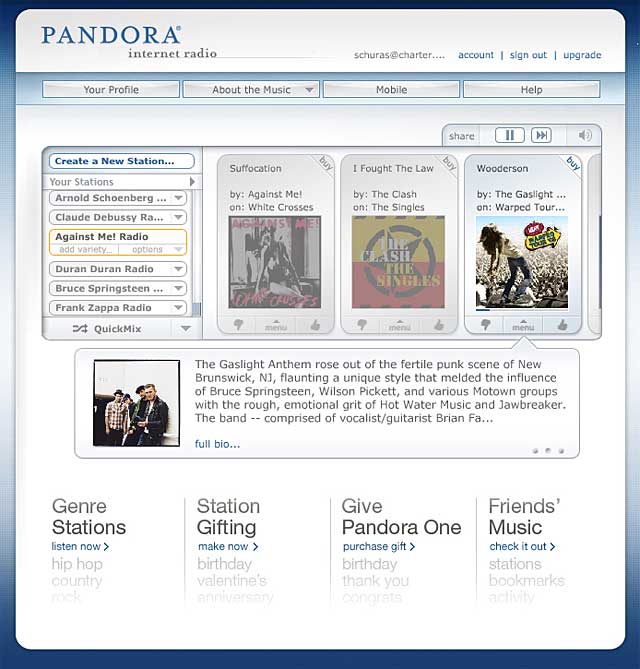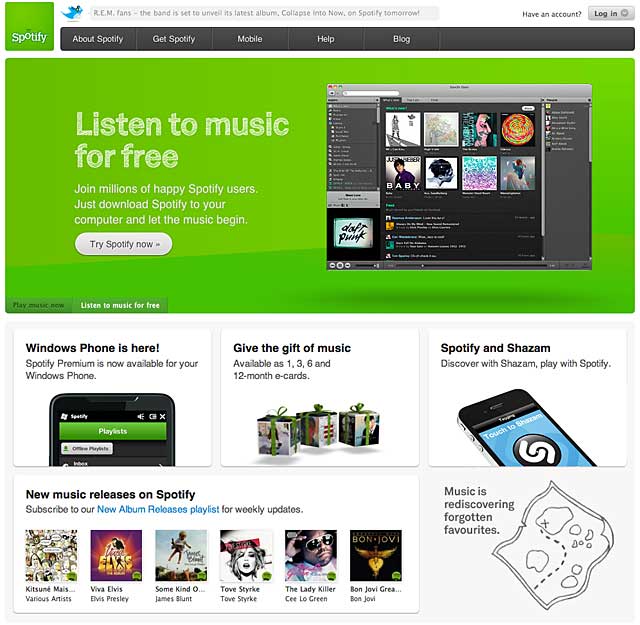2011 Will Be the Year of Streaming Music
Last year was the year of Facebook, or at least the year of Mark Zuckerberg, the movie and the ubiquitous nerd. But 2011 is shaping up to be the year of streaming music, and there's no monolithic personality behind this juggernaut, not even Steve Jobs, whose streaming music proposition for iTunes is reportedly launching this year. It will have to compete with a couple dozen other streaming music entities. This includes the smartly helmed Pandora, which has been cutting deals to get under our skins through whole-house automation systems and automotive audio. Spotify, the Swedish service that gave music streaming its best traction in Europe with 10 million subscribers, keeps delaying its arrival in the U.S.-which remains the world's biggest market with music sales worth $4.6 billion in 2009. Last.fm, the U.K. service that CBS acquired in 2007, topped 40 million users and offers a well-rounded array of content besides music. Others have been waiting for the techno-entertainment culture to migrate from ownership of file-based media to being able to pull it down from anywhere, anytime.
The shift from downloading to streaming is tectonic by digital standards, and, like the transition from optical media to downloads before it, it will be accompanied by much teeth gnashing and lawyer wrangling as royalty payment standards are worked out as much in the courts as in the smoke-free back rooms of Palo Alto, Calif. In fact, London's Financial Times asserts that attempts by Spotify and others to launch in the U.S. have been delayed mainly by the complexity of negotiating licensing terms with record companies and music publishers, not the underlying technology.

In addition to being a leading service for streaming music to PCs and mobile devices, Pandora has been cutting deals to get on set-top boxes and automotive audio systems.

While much of Europe has been enjoying Spotify's streaming service for more than a year, licensing issues have long prevented its launch in the U.S.
The Sound of Streaming Music
But what the transition means for the audio quality of music is less murky to parse. Just as download files were finding an audiophile channel, with bulked up 256Kbps versions and even lossless WAV, FLAC, and ALAC files making their way around the internet, streaming comes along and presents music with an even broader landscape.
"Wouldn't it be nice if one of these days people who write music and people who write code could actually get together with each other?" asks Robert Reams, a tech entrepreneur who sold his most recent company, Neural Audio, to DTS, Inc. 2 years ago. He says that the processing of music is going to have to change to accommodate streaming. Reams says that spatial (imaging) and temporal (timing) differentials between the left and right axis of music are to blame for most of the artifacts that lossy codecs such as MP3 and AAC create when they process music.
Related Articles
Listeners get access to more songs and discover new acts, leading to less illegal downloading.
19 Aug 2010
Integrating Lala's streaming service could take iTunes to a whole new level.
30 Apr 2010
Apple's purchase of Lala suggests that iTunes might begin to offer a streaming listening service, while Vevo hopes to become a Hulu for music videos.
Mon., Dec. 7, by Tim Siglin
07 Dec 2009
Companies and Suppliers Mentioned